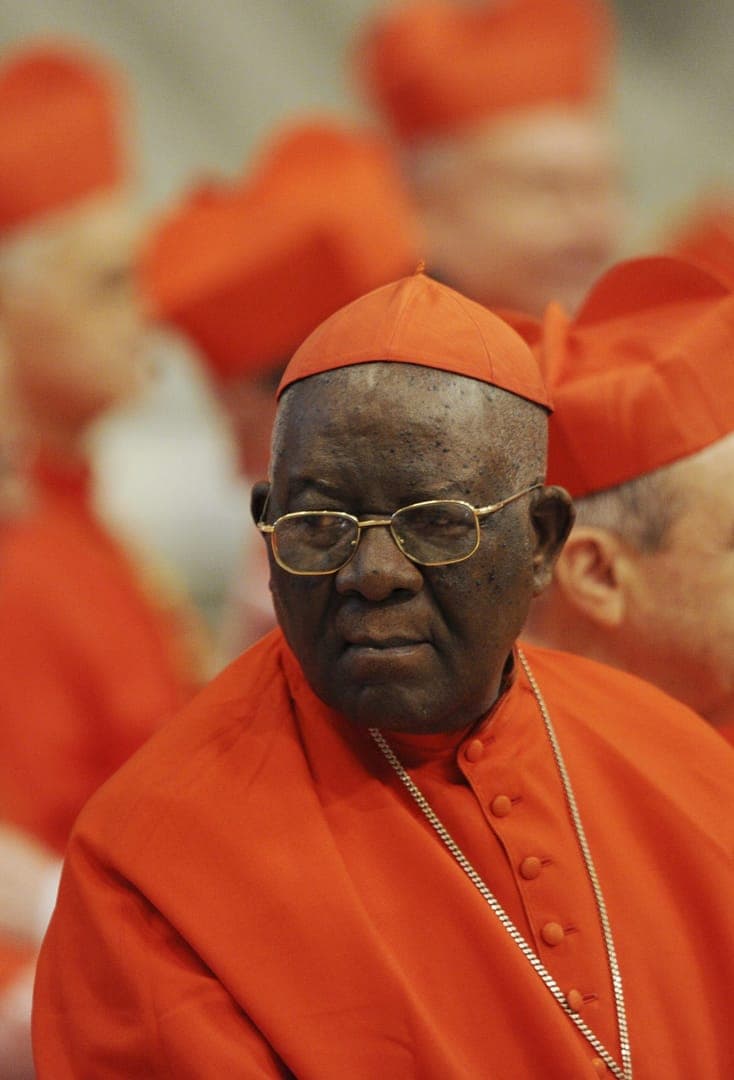YAOUNDÉ, Cameroon – Cameroon’s lone cardinal was questioned about his lack of support for Anglophone independence when he was kidnapped earlier this month by rebels.
Cardinal Christian Tumi, 90, was stopped by gunmen on Nov. 5 when he was travelling to his native Kumbo from Douala. The kidnapping took place in Babessi, located in Cameroon’s restive North West Region.
“About five gunmen came out of the bush, pointing the gun at us, ready to pull the trigger,” Tumi told Crux, in his first interview about the event.
RELATED: Cameroonian cardinal kidnapped and later released by separatist rebels
“They ordered me out of my car. I came out. Other people with whom I was travelling tried to resist. I told them to come out of their cars as well. They took us on motor bikes and traveled with us for about ten kilometers. For me, who had just celebrated my 90th birthday, it was really painful,” the cardinal said.
He said once at the hideout of the gunmen, they sat on stools throughout the night.
“For a long time, nobody said anything. They were looking at us and we were looking at them,” Tumi recalled.
But eventually, the gunmen – suspected to be Anglophone separatists – interrogated the cardinal.
They wanted to know why Tumi, as a well-respected Anglophone in Cameroon, would discourage independence for Cameroon’s Anglophone regions.
“I stand for peace,” Tumi said he told them.
During the exchange with his captors, the cardinal said he discovered the true reason for his kidnapping.
“They told me I was taken because I am an international figure. I think what they meant by that is that since I was appointed by the pope, many people obviously know me. And for someone appointed by the pope to be kidnapped, it would lead to lots of conversations and by merely talking about it, their struggle will also be known internationally,” he told Crux.
Asked whether he suffered any form of physical abuse during captivity, Tumi said he wasn’t handled roughly, and added that he “refused to be tortured psychologically.” The moment I found myself in that position, I refused to be worried psychologically, because it would defeat you intellectually. So, I stayed calm,” he explained.
While many clerics, including Bishop Cornelius Fontem Esua, have been kidnapped since Cameroon’s Anglophone crisis began in 2017, Tumi said he didn’t expect to be taken that day.
“It came to me like a bolt in the blue. I thought I was dreaming, but that was the reality,” he told Crux.
The cardinal’s kidnap came the same week that 11 schoolteachers in Kumbo were kidnapped and later released by separatists.
RELATED: Jesuit priest arrested before ‘pilgrimage for peace’ in Cameroon
The Anglophone crisis began in 2017, after teachers and lawyers went on strike over perceived attempts by the central government to assimilate the common law and English education systems Cameroon’s Anglophone regions inherited from their previous British colonial government. The rest of Cameroon is Francophone, and inherited France’s civil code legal system, and French educational system.
The strikes were violently suppressed, giving rise to a separatist movement attempting to establish an independent state to be known as Ambazonia.
At least 3000 people have been killed in the conflict, and more than a million forced from their homes.
Both sides have been accused of atrocities, and the separatists have been especially condemned for its use of violence to enforce a school boycott in the Anglophone regions.
On Oct. 24, attackers armed with guns and machetes stormed Mother Francisca Memorial College in Kumba, killing at least seven students and wounding a dozen others.
RELATED: School shooting ‘darkest day’ of Cameroons Anglophone crisis
While English speakers have often complained about marginalization, a study carried out by an ecumenical group of Church leaders led by Tumi noted that country’s problems actually stem from gross misgovernance.
“The dominant cause [of the current crisis] is bad governance. 92 percent of respondents said the country is badly governed,” Tumi told Crux.
“What they mean by bad governance could be the subject of another study,” he added.
Asked what the solution to the crisis should be, Tumi recalled an answer he received from an old woman after asking her the same question.
“She told me that for peace to return and for schools to resume, the military must go back to the barracks, and these boys who are in the bushes and holding guns illegally must drop their weapons. Her answer is also mine,” he said.
But the cardinal added that he believes there is only one person who can make this happen: President Paul Biya, who has ruled the country since 1982.
“If tomorrow, President Paul Biya grants a general amnesty and orders the military back to the barracks, the separatists could also drop their weapons, and there will be peace,” Tumi said.
However, Biya has taken a hard line against the separatists, who he has designated terrorists.
Tumi said this will only result in more bloodshed.














